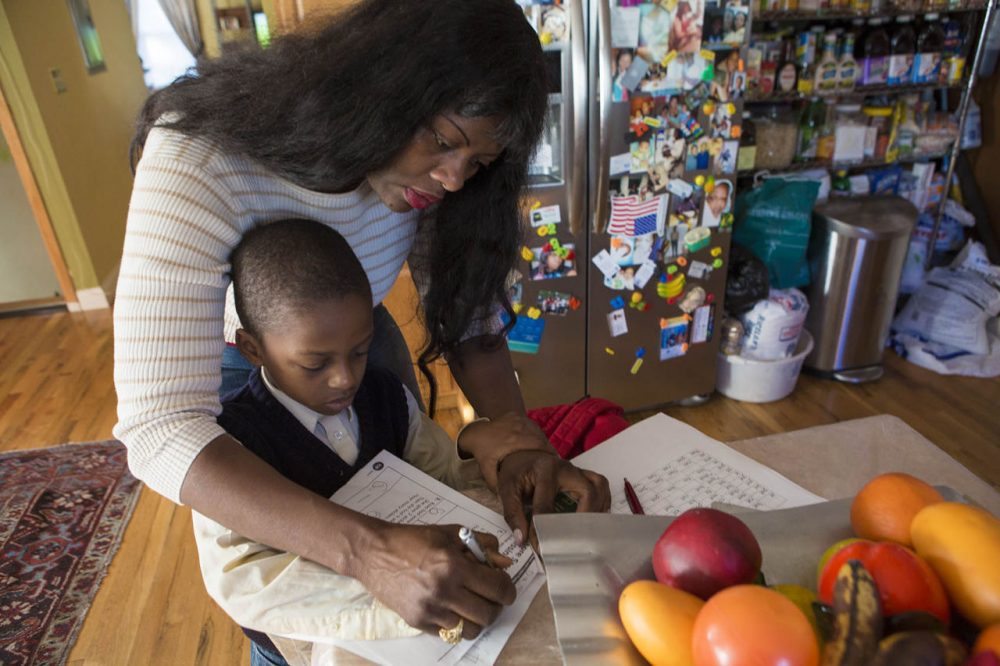Advertisement
Beyond Kindergarten Suspensions: Don't Shame Children — Teach Them

WBUR analysis of state data shed much-needed light on a serious issue facing our youngest students: distressingly high levels of suspensions for kindergartners and even preschoolers. What are teachers and schools to do instead? Is it as simple as what one veteran kindergarten teacher, interviewed for the WBUR feature, described as using “angry teacher voice” and “angry teacher face?" Not even close.
Just like a suspension, angry teacher voice does not teach a child why his behavior is hurtful or disruptive, and it doesn’t teach him what to do differently next time. It doesn’t communicate that the teacher cares about her students and wants them to feel part of a community. And it definitely doesn’t address the root issues of a child’s behavior: frustration, confusion, trauma — or even a classroom that isn’t set up for young children.
...angry teacher voice does not teach a child why his behavior is hurtful or disruptive, and it doesn’t teach him what to do differently next time.
Angry teacher voice might elicit compliance in the short term, but it doesn’t teach a child to self-regulate. Self-regulation is a crucial skill for success in school and life; it enables us to be in charge of our thoughts, feelings and behaviors, to set and reach our goals. But too many classrooms are run by control and fear rather than by building self-regulation.
Good classroom management starts -- but does not end -- with engaging children in activities that use their hands and captivate their minds. Young children are built to explore; they need to move frequently and do new things every day. They should not be expected to sit at desks all day or remain silent while eating lunch or walking in the halls. Those expectations set young children up to fail. Yet they are part of a growing national trend to force more structure and “rigor” on 4- and 5-year-olds. Programs and curricula that are designed for and tested with young children, like Tools of the Mind and the Building Blocks math curriculum that is used in Boston Public Schools (BPS), can help teachers build children’s skills in more age-appropriate ways.
While they explore, young children also need predictability. When you enter a classroom that runs smoothly, you see consistent routines. Children understand that time to build with blocks will be over when the cleanup song ends and know that morning meeting begins with everyone doing a rhyming chant. They feel secure and act cooperatively because they know that the classroom will be run fairly, that everyone takes turns sharing their drawings, not just the “good” or “smart” kids, who seem to get chosen because they are the teacher’s favorites.
Clear expectations for behavior must be part of that predictability, but young children can’t remember long lists of seemingly arbitrary rules. They need a few concise guidelines, like “be safe, be kind, be responsible” and examples of each. Teachers should reinforce them: “I like the way Jayden is being safe in line by holding his partner’s hand.” Children should, too: “Kylie was kind when she helped me rebuild my Lego building that she knocked over!” And when a child acts in a way that is inappropriate or unacceptable, teachers should tie it back to the expectations, saying, for example, “It’s not safe to push in line,” instead of getting angry.
Of course, children will sometimes misbehave, even when all of these pieces are in place. In those moments, children don’t need to be shamed, they need to be taught. They learn when teachers and classmates explain why their behavior was harmful, get the chance to talk about it, and have opportunities to make it right. Abby Morales recommends a simple but powerful strategy when she coaches pre-K and kindergarten teachers as part of her work in BPS’s early childhood department: Instead of asking a child to issue an apology, which is usually empty or flippant, encourage her to do a “check-in” with the person she offended or hurt. The check-in includes asking, “Are you OK?” And, if the answer is “no,” following up with “How can I help?”
...children don’t need to be shamed, they need to be taught. They learn when teachers and classmates explain why their behavior was harmful, get the chance to talk about it, and have opportunities to make it right.
With the assistance of Morales and her colleagues, many Boston schools are bucking the trends identified in the report on school detentions, supporting children to learn socially, emotionally and academically in developmentally appropriate ways. BPS’s K1 program is a highly successful national model for pre-K, and its curriculum and coaching are now being expanded into several community-based preschools with the support of a federal grant. Teachers and children are making big strides in behavior and learning. But they are an exception to a national pattern; studies show that most early childhood classrooms have mediocre teacher-student relationships and distressingly low levels of emotional support, which has been shown to predict lower student achievement.
Early childhood teachers have a unique window to shape children’s self-regulation. The window never really closes, but it is wider at ages 4 and 5 than later, when children’s behaviors become persistent patterns. Kindergartners and preschoolers are counting on us to help them do and be their best. Ending suspensions is a vital step, but it’s just the beginning.
